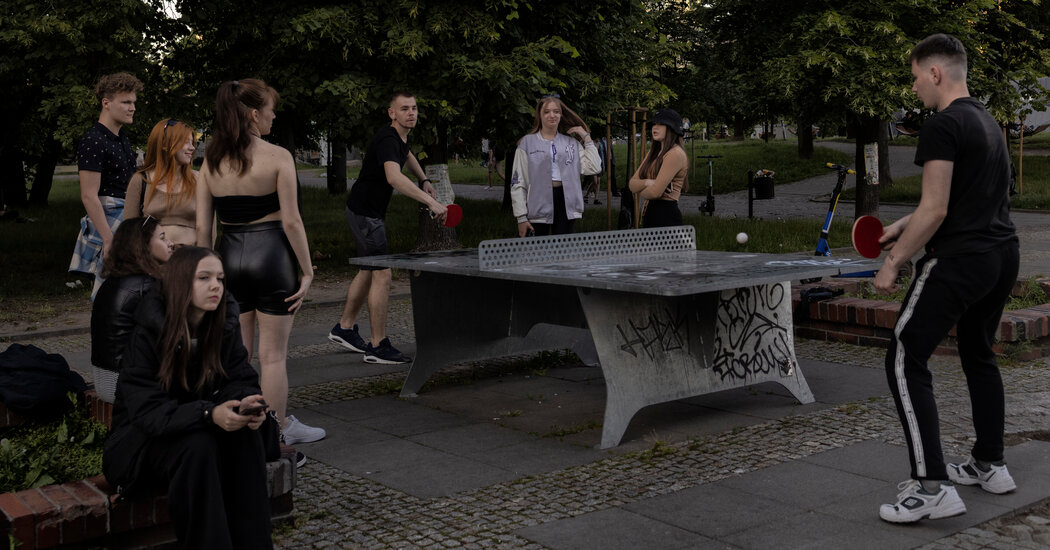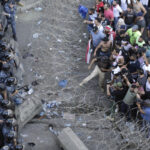
WARSAW — Every afternoon at a park outside a distinctively Stalinesque skyscraper in central Warsaw, scores of Ukrainian teenagers come together. They are young refugees, trying to cope.
Many have quit school to drift around Warsaw, rootless, lost even, as young as 14 or 15, smoking cigarettes and swigging cheap beer. They gather under the maple trees, playing Ping-Pong or sprawling out on the benches, heads in each other’s laps, wondering what to do.
“I’ve seen some wild stuff here,” said Mark, an 18-year-old Ukrainian who was hanging out the other day in the park. “Knives. Guns. Drunk kids fighting.”
The teen years are hard enough anywhere. Bodies change. Carefree childhood swirls away. Everything gets more serious so fast.
But for the one million or so Ukrainian teen refugees, it’s like the mirror they were peering into, trying to figure out their futures, exploded in their faces.
Just as they were becoming adults, Covid upended the world. And just as the pandemic was finally lifting, their country was invaded and flung into war. Their families were split up. Their towns were bombed. They fled to foreign lands and four months later, with the conflict still raging, they have no idea when, or even if, they will ever go home.
“Every day I must choose,” said Mark, who escaped Ukraine right before his 18th birthday to avoid military service and didn’t want to share his last name for fear of being punished or, at a minimum, ostracized if he returns. “I could come here and hang out with my friends and have a good day. Or I could go back to my room and study and have a good future.”
“Man,” he said, smiling a charming young man’s smile. “I really wish I could be a 15-year-old boy again who didn’t have to think about the future.”
A hallmark of any war is children on the move. Masses of them. Terrified. Fleeing something they don’t understand. Going somewhere they don’t know. Think of the Kindertransport of Jewish children before World War II. Or the Lost Boys of Sudan, trekking through a hellscape of violence and drought to stumble half dead into Kenyan refugee camps.
Ukraine created an exodus of young people, too. As soon as Russia invaded, countless parents made the agonizing decision to uproot their children and get them to safety. Most crossed into neighboring countries with their moms but without their dads, because of Ukraine’s restrictions on military age men, 18-60, leaving the country.
But some teens took off without any parent. The New York Times interviewed a half dozen in the span of a couple days in Warsaw. They were put in the hands of fleeing friends or family, or, in some cases, they crossed international borders alone. Sprinkled throughout Warsaw in rented apartments, or with Polish families, or some by themselves in dorms, these are the refugees who face the highest risks.
Better Understand the Russia-Ukraine War
“The little kids will integrate. The adults will get jobs,” said Krzysztof Gorniak, a chef in Warsaw who runs several nonprofits helping refugees.
But the teenagers, he said, “don’t know if they should build a life here or just spend time drinking, doing drugs and playing.”
Maxym Kutsyk, a 17-year-old orphan, said he had left without permission from a youth hostel in central Ukraine.
“It was a matter of danger and safety,” he said, about fleeing the war. “But it was something else,” he explained. “I wanted to get out. I wanted to see the world.”
Now he lives with his half sister, her three young children and her boyfriend near Warsaw in a tiny slit of an apartment.
The youth hostel Maxym fled, the last stage in Ukraine’s orphanage system, was tied to a vocational school. But in Warsaw, he’s not taking any classes — he’s not interested — and avoids eye contact and stands slightly stooped, like bracing for a blow. The highlight of his week is a boxing class, but he’s holding on to a dream.
“I want to go to the United States,” he said. “It’s very beautiful there.”
How does he know?
“I’ve watched TikTok.”
Across town in the pretty, quiet neighborhood of Muranow, Katya Sundukova, 13, works on her drawings. As she clutches a pencil and leans over a black-and-white sketch, her pink Mona Lisa socks peeking out, she radiates an intensity.
She wears big headphones and listens to Tchaikovsky and Japanese hip-hop. People are talking in the room and moving in and out but her attention is focused purely on the pencil in her hand and the figures emerging.
“I see the war as pointless,” she had said in an earlier conversation. “I kept asking my mom: Why did they attack us? I never got an answer.”
At the beginning of the war, the explosions in Kyiv, where Katya lived, disturbed her.
“She just sat in her room talking to her cat,” said her mother, Olga. “Her interlocutor was the cat.”
Her mother made the difficult decision to get her out. But she is a lawyer with a busy practice. If she left Ukraine, she said, “Who’s going to support me financially?”
So she sent Katya to live with her other daughter, Sofia, who was working for a magazine in Warsaw, though Sofia, 22, said, “I’m not ready for being her mom.”
The whole family, like so many others from Ukraine, has become a study in resilience. Katya has learned to cook dinner, with macaroni her specialty. She started a new school in Warsaw — a Ukrainian one — midsemester, but with her sister working and her mom usually far away except for the occasional visit, she is also learning how to deal with emotions and fears on her own.
As she stood back from her drawing, a precociously skilled portrait of three fantasy figures, Katya allowed herself a look of satisfaction.
“The sketch is finished,” she announced. “The only thing left is to hang it in my room in Kyiv.”
A few days after the war broke out in February, Mark fled the battered city of Kharkiv by himself. He was scared he would be stopped at the border because he was 17 and traveling alone. But in the chaos he slipped through, no questions asked, arriving in Warsaw four days before his 18th birthday, when he would have become of military age and unable to leave.
“I didn’t want to fight in this war,” he said. “It’s a stupid war.”
Mark was given a room in a college dorm not far from the Vistula River, which flows through Warsaw.
When he’s not studying computer programming online at two universities, he’s hanging out at “the Park.”
There are many parks in Warsaw — a verdant city, especially lovely in June — but “the Park” all the Ukrainian kids talk about lies in the shadow of a Warsaw icon: the Palace of Culture and Science. Completed in 1955 but commissioned during Stalin’s final years, it is a 42-story monument to Poland’s socialist days, hulking but somehow still elegant.
Before the Ukraine war, the park out front had been neglected, becoming a campground for the homeless.
But starting in March, Ukrainian teens discovered it. The volleyball court is always busy. There’s a skate park where shirtless Ukrainian kids clatter on their boards and wipe out noisily. Young women sit under the trees and take it all in.
Mark said that in the park, people don’t talk about the war.
“If you want friends,” he said, “you don’t talk politics. Because everyone has a different view of the situation.”
And while it’s hard being without his parents, he said, and not knowing what lies ahead, he also feels a sense of possibility, of having a future that is yet to be carved.
“Life’s not bad,” he said. “Warsaw is a beautiful city. I go around by myself, sightseeing.”




